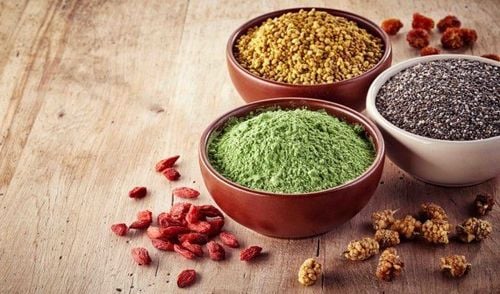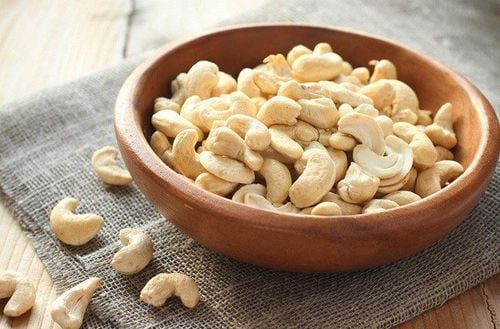This is an automatically translated article.
Cashew nuts are a healthy food because they contain many unsaturated fatty acids, vitamins and minerals. These nutrients all play a role in supporting blood function and the immune system, and help prevent some cardiovascular diseases, kidney stones.
1. Where do cashews come from?
Cashews are a type of nut that is soft and has a sweet taste. They are native to South America, specifically Brazil. These regions are the largest cashew nut producers today. Cashews are sold either raw or processed as roasted or salted. Cashews are also used to produce milk substitutes such as cashew milk, cheese, cashews with cream sauce...2. Nutritional composition of cashews
Nutritional composition of cashew nuts in 100 grams of edible include:
Energy: 605 Kcal Protein: 18.4 grams Glucid: 28.7 grams Lipid: 46.3 grams Fiber: 0.6 grams Vitamins: vitamin E (0.9 mg), vitamin K ( 34.1 mg), vitamin B6 (0.417 mg) Minerals: Calcium (28 mg), Sodium (12 mg), Potassium (660 mg), Magnesium (292 mg), Folate (25 mcg)
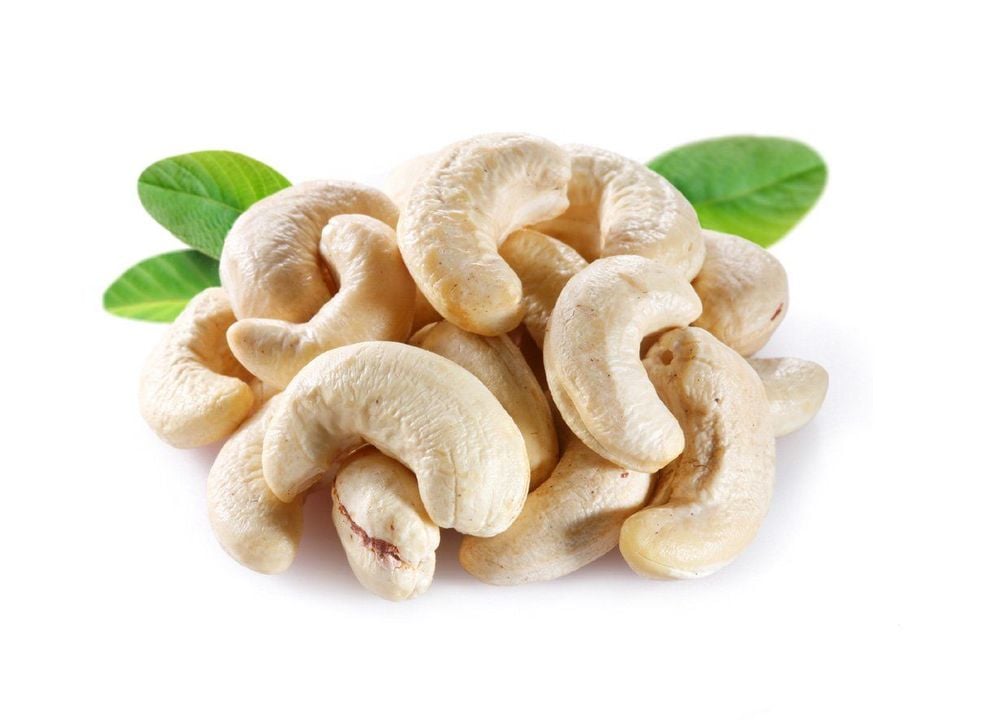
Hạt điều chứa nhiều thành phần các chất dinh dưỡng tốt cho cơ thể con người
3. Nutritional Benefits of Cashews
Although cashews are one of the low-carb, low-fiber nuts, they are packed with vitamins and minerals, and antioxidants. These ingredients are all vital to many bodily functions.
3.1. Cashews are good for heart health Studies have shown that eating more cashews can reduce the risk of cardiovascular disease. This can be done by lowering blood pressure and cholesterol. This reduction may be because the monounsaturated fatty acids and polyunsaturated fatty acids present in cashews can reduce LDL cholesterol and triglyceride levels.
A study published in the British Journal of Nutrition found that the risk of heart disease, coronary heart disease can be 37% lower in people who consume cashews more than 4 times a week compared to those who never eat them. this seed. In addition, cashews also contain a number of vitamins and minerals such as potassium, vitamin E, B6, folate, which also works against cardiovascular disease.
The Food and Drug Administration has approved several health claims for food labels that are: “eat approximately 45 grams/day of most nuts in a diet low in saturated fat and cholesterol can reduce the risk of cardiovascular disease.

Sử dụng hạt điều trong thực đơn hằng ngày giúp giảm nguy cơ mắc bệnh tim mạch
3.2. Weight control Some data shows that regular nut consumption, including cashews, is associated with higher energy expenditure during rest. This could have implications for weight management. Additionally, in trials comparing weight loss between diets that included or excluded nuts, diets that included cashews were associated with greater weight loss.
Another study published in the American Journal of Clinical Nutrition found that women who rarely ate nuts had a higher rate of weight gain over an 8-year period than women who consumed nuts. above 2 times/week. The researchers concluded that eating cashews does not lead to weight gain and it may even help maintain a healthy weight.
A meta-research review published in 2017 concluded that nuts including cashews can help maintain a healthy weight. Because, cashews increase the feeling of fullness and contribute to thermogenesis, helping to increase metabolism in the body.

Hạt điều giúp người dùng kiểm soát cân nặng tốt hơn
3.3. Gallstones According to a study in the American Journal of Clinical Nutrition, regular nut consumption is associated with a reduced risk of needing gallbladder surgery. In more than one million women recorded over a 20-year period, women who consumed more than 150 grams of nuts/week had a significantly lower risk of cholecystectomy than women who ate less than 30 grams of nuts/week. the week.
3.4. Bone Health Cashews are one of the few foods high in the mineral copper. 30 grams of cashews contain about 622 micrograms of copper. For adults, the recommended amount of copper per day is 900 micrograms. Severe copper deficiency is associated with bone mineral density and an increased risk of osteoporosis. However, more research is still needed on the effects of copper deficiency and the potential benefits of copper supplementation for the prevention and management of osteoporosis.
In addition, copper also plays an important role in maintaining collagen and elastin - the main structural components of the body. Without enough copper, the body cannot replace damaged connective tissue or collagen to give structure to bones. It can lead to a variety of problems including joint dysfunction as body tissues break down.
Other minerals in cashews such as: Magnesium is also important for bone formation as it helps to assimilate calcium into bones or manganese has also been shown to play a role in preventing osteoporosis.
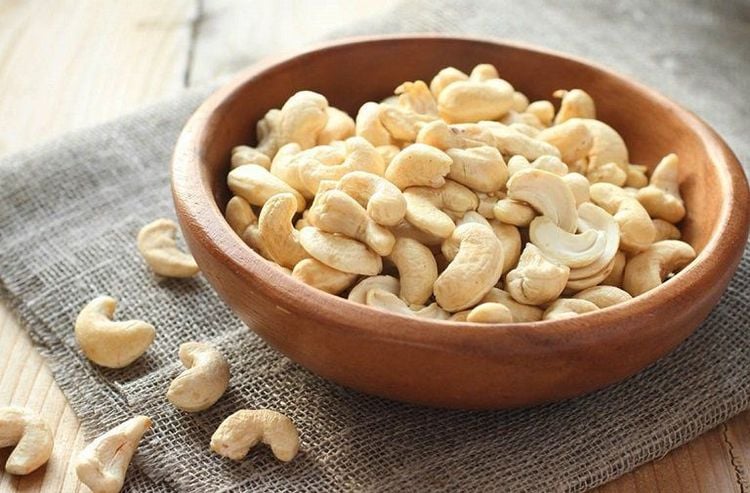
Sử dụng hạt điều đúng cách giúp người bệnh ngăn ngừa loãng xương
4. Some risk factors when using cashews
Cashews contain a lot of fat, but these are mostly healthy unsaturated fats in moderate amounts. Because, these unsaturated fats are easy to oxidize and create carcinogens.
Raw cashews are actually not safe to eat because they contain urushiol, which is found in ivy. Urushiol is a harmful toxin and when exposed to it can cause skin reactions.
Cashews are usually sold as processed. However, with processed cashew products, they often have a high salt and fat content that is not good for health. Therefore, it is necessary to carefully check the label about the ingredients of cashew products.
People with a nut allergy should avoid using cashews, as they contain strong allergens that can lead to life-threatening reactions such as anaphylaxis.
5. Cashew preservation
Nuts including cashews are high in fat and they can be easily oxidized. Oxidized cashews have a burning smell and are not safe for human consumption. Therefore, cashews need to be stored in a cool place and dried to increase shelf life. If cashews are stored properly it can keep for several months at many room degrees. About 1 year in the fridge and 2 years in the freezer.
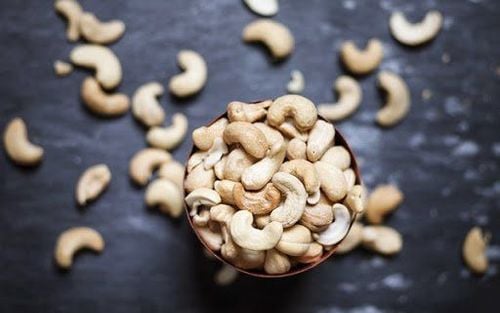
Hạt điều cần được bảo quản an toàn tại nơi thoáng mát
In order to improve the quality of medical examination and treatment, now Vinmec International General Hospital has put a system of modern medical machines up to standard in the examination and treatment of diseases. Especially with the implementation by a team of qualified, experienced doctors who wholeheartedly care, treat, restore and advise on maintaining a healthy lifestyle, it will bring the best results for customers.
Customers can directly go to Vinmec Health system nationwide to visit or contact the hotline here for support.
References: medicalnewstoday.com, healthline.com




